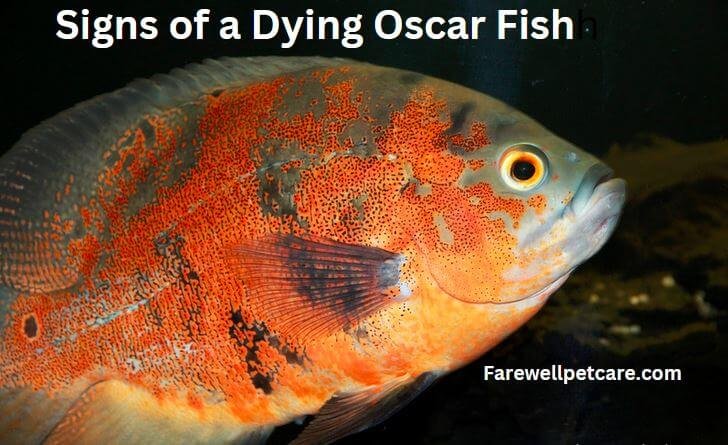As a dedicated aquarium hobbyist, seeing a dying Oscar fish can be worrying and sad. As sad as it sounds, someday, your beloved Oscar will die for some reason – whether it’s old age or disease. So, how about you know the sure signs of a dying Oscar fish so you can save your fish where possible?
The general signs of a dying Oscar fish include changes in behavior patterns like general lethargy and sluggishness, labored breathing, white spots on the body, seclusion to the bottom of the tank, appetite loss, erratic swimming, abnormal feces color, and unusual scratching, among other symptoms.
In this article, you’ll learn the symptoms to look out for and get recommendations on what to do to save your dying Oscar fish. Stay tuned.
10 Signs of a Dying Oscar Fish
The thought of your beloved Oscar fish dying is distressful for any aquarium hobbyist. Noticing whether your fish is sick or dying sounds easy any day. However, sometimes your Oscar may hide symptoms, and before you know it, the fish is dead.
Hence, it’s super vital to understand the signs when your fish is dying. Let’s explore different signs to help you diagnose a sick Oscar.
1. Loss of Appetite
Without a doubt, appetite loss is a big warning sign of a dying fish. If your Oscar fish suddenly stops eating or perhaps shows a deliberate lack of interest in food, the fish is likely sick.
Loss of appetite can occur due to stress, environmental changes, and internal factors, including diseases and parasites.
On top of that, a fish that refuses to eat indicates an underlying health problem. It could be experiencing discomfort or pain that hinders food intake. Likely causes for such may be dental issues, stressors, and water quality problems.
Moreover, if your fish is struggling to swallow food, there could be a serious problem in the digestive system, such as a blockage or infection. So observe, consult the vet, and take action.
Find Out: If a Fish Dies Should I Change the Water?
2. Change in Discoloration

A sick or dying Oscar fish develops changes in skin coloration. With that in mind, your fish could experience fading and darkening skin colors. During an ailment, the fish gets stressed and eventually changes its color.
Also, changes in water conditions may trigger color changes. If your Oscar fish changes color to white, it could be suffering from ich. This parasitic infection causes the fish’s skin to develop white spots.
Furthermore, a disease like Hole-in-the-Head causes a white discoloration to the fish’s skin. So, you need to take immediate action even with the slightest coloration changes. Remember, Oscar fish are popular for their striking, bright colors.
However, an Oscar fish can also change color due to mood swings. So, coloration changes are not always a sign of disease or infection.
3. Respiratory Problems
Anyone can guess a fish is sick when they observe respiratory problems such as difficulty or distress breathing.
Poor tank conditions like accumulation of carbon dioxide or excess ammonia often suffocate the fish underwater.
Such conditions reduce the supply of oxygen in the tank. In the process, the fish experiences respiratory issues and may move up to the water surface, gasping for more air.
In addition, gill infections can hinder normal breathing in the Oscar fish. Therefore, you have to be on the watch for any heavy or rapid breathing.
Seek the vet’s assistance if you find the respiratory problems persisting for long.
4. Erratic Swimming Patterns
Generally, a healthy Oscar fish swims linearly. If it becomes ill, you’ll notice a change in the swim pattern.
Usually, the fish lacks balance in its movement and experiences difficulty maintaining balance.
So, if your fish appears lethargic and stays in one place for long without making movements, it could be distressed or sick.
Furthermore, uncoordinated movements may suggest neurological issues or severe stress. That’s why you may see the fish swimming in circles, in a corkscrew pattern, or upside down.
When the Oscar fish swims rapidly or in a jerky fashion, you could think about it as a response to environmental changes.
Abnormal swimming behavior of your Oscar fish, such as difficulty swimming up and down, strongly indicates buoyancy-related conditions like swim bladder or fin damage.
5. Fish Has Physical Abnormalities

In addition to the above signs, a dying Oscar fish will display visible deformities on the body. You may easily spot issues on the fish’s skin, fins, and other external features.
For example, the fish may have the following types of physical abnormalities;
- Sores and lesions: Sores, lesions, or ulcers usually result from physical injuries, bacterial infections, or fungal infections. Parasites also cause physical injuries to the internal structures.
- Tumors: You may also see tumors or abnormal growths on your fish’s body. Pathological conditions and cysts could cause these.
- Protruding eyes: Eye infections are common in Oscar fish. Diseases like Popeye can lead to swollen or protruding eyes in fish. Eyes also appear cloudy.
- Torn fins: When you see torn or damaged fins, know your fish is severely injured and sick. The damages could be a result of aggressive tankmates.
6. Changes in Feces Appearance and Frequency
The fecal appearance can indicate whether your Oscar fish is sick or healthy. The color, consistency, and frequency are important parameters when gauging your Oscar fish’s health.
Usually, sick Oscar fish’s feces appear white and stringy. This appearance may indicate the effects of internal parasites like worms, bacterial infections, or digestive issues.
On the other hand, blood in feces may indicate internal injuries or infections. Unusual consistency, such as soft or watery feces, can result from dietary issues, bacterial infections, or internal parasites.
Hard feces are caused by constipation, especially when you don’t give your fish enough fiber and dehydration. A fish that’s constipating may also have prolonged intervals between bowel movements.
All said, defecation frequency can tell whether your fish is sick. If your Oscar fish does defecate every time, it could indicate stress or irritation.
7. Resting at the Bottom of the Tank
It’s not uncommon for the Oscar fish to sit on the tank floor. However, this may be probably due to hiding from aggressive tankmates, and does not last long.
If your Oscar fish sits down there for extended periods, there’s a serious problem.
In that regard, resting at the bottom of the tank can show that your fish has respiratory issues due to poor tank conditions.
In similar circumstances, unusual body position during rest can indicate that your fish is sick. For example, the fish could head-tilt or body-tilt due to neurological conditions, internal infections, or issues with the inner ear.
8. The Fish Isolates From Others
When your Oscar fish voluntarily isolates itself from the rest of the community in the tank, it’s probably stressed, unwell, or needs a break. This is mostly common in larger tanks that have enough hiding spots.
Similarly, the Oscar fish could flee to hiding when bullied or harassed by other tankmates. Aggression from a more aggressive fish causes the Oscar fish to concede and isolate itself.
It’s important to note that the Oscar fish most likely knows its point of vulnerability. Sickness is such a moment. So, the best option for the fish is to seek a quiet place away from disturbance.
9. Oscar Fish Scratches Excessively
Another huge sign is excessive scratching. This is also called flashing, where the Oscar fish rubs itself against surfaces or objects in the tank. Scratching is predominantly due to;
- External parasites: These are the main problems for Oscar fish. When they infest the fish, white patches begin forming on the body. They can spread to the entire body. At this point, the fish will bang against the objects and surfaces in the aquarium.
- Skin irritation: This comes about mainly as a result of skin flukes.
- Infections: These could be bacterial or fungal infections that cause irritation and discomfort on the skin.
Rubbing indiscriminately due to discomfort can make your Oscar utterly sick.
10. Clamped Fins
In some cases, your fish’s fins are clamped together. Clamping of the fins occurs when fins are held closely to the body instead of being open and erect. Hence, the fish’s movement is limited.
A fish with clamped fins is outrightly in distress. Several things cause this situation. For instance, stressors in the aquarium include shifts in water parameters, temperature fluctuations, and poor-quality water.
Alternatively, your Oscar fish may develop clamped fins due to disease, infections, or injury.
How to Save Your Dying Oscar Fish in 5 Ways
You can save your dying Oscar fish in many ways. Let’s consider five crucial ways that can help your fish extend its life in the aquarium.
1. Perform Water Changes Regularly
Changing water in the aquarium is an ideal way of reducing toxins. When you minimize toxins in the tank, your fish are unlikely to get sick.
That said, you can change 20% of the water in the tank weekly. When doing this, use dechlorinated water at the same temperature as the tank to ensure you’re not introducing new conditions that would affect your fish.
2. Isolate and Quarantine the Sick Fish
Isolation of the sick fish has two benefits;
- It gives the sick fish peace to rest well
- It helps stop the spread of disease to other tankmates
While in isolation and quarantined, you can easily monitor and treat your sick Oscar fish without distractions.
Ensure the quarantine tank has parameters similar to the main tank.
3. Provide Treatment
You need to call your veterinarian to observe and treat your fish. The vet will diagnose the exact problem of the fish. The vet can also recommend suitable treatments for the sick Oscar fish.
Remember not to treat the Oscar fish by yourself. You may not know what is ailing your fish and give the wrong meds.
4. Provide Optimal Nutrition
Keep your Oscar fish healthy with proper nutrition, featuring a well-balanced diet. With a good diet, the recovery of your fish will be fast and smooth.
To that effect, ensure you offer a high-quality and easily digestible diet. For instance, provide your Oscar fish with specially medicated food, live or frozen bloodworms, and brine shrimps. The diet should also have high-quality fish pellets and flakes.
Watch and observe whether the fish is eating well. Adjust feeding according to the fish’s response to the food provided.
5. Maintain a Stress-Free Environment
If your fish has to recover fast and smoothly, minimize stressors in its immediate environment. You should understand that stress weakens your fish’s immunity.
Therefore, do the following:
- Add hiding spots and structures in the tank to help your sick fish find enough rest.
- Keep the tank conditions stable always. Avoid sudden changes to water parameters like temperature, lighting, and tank decorations.
- Ensure you change the water regularly. Also, maintain proper filtration to keep impurities level checked to a minimum.
Final Thoughts
Now that you know the signs of a dying Oscar fish, I believe you’ll become a vigilant guardian of your fish.
If you notice any of the above signs, don’t hesitate to take the necessary steps to save your Oscar fish. Remember, the first action is to consult a veterinarian to diagnose the fish and provide a solution.

